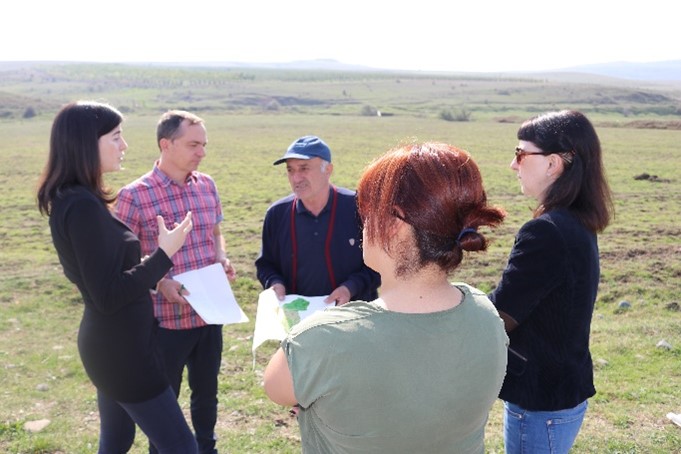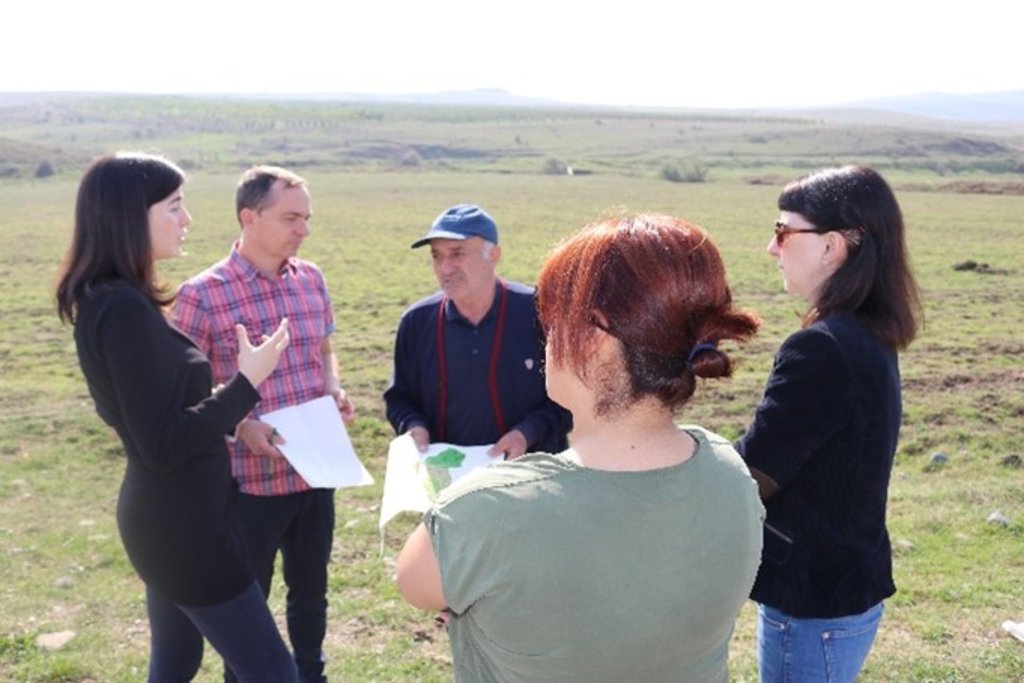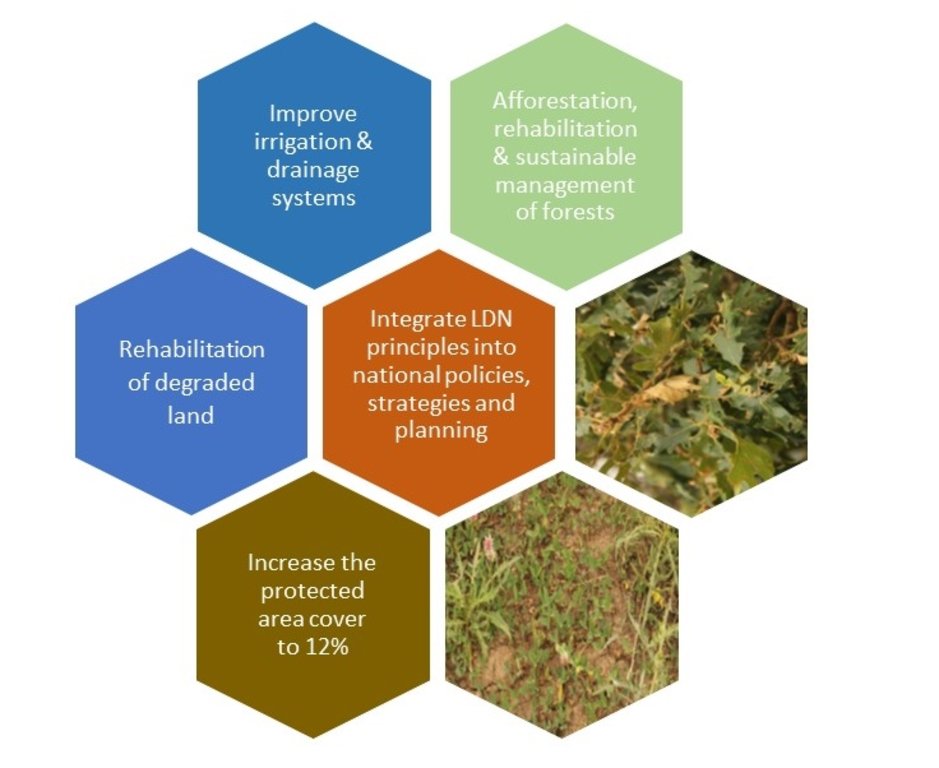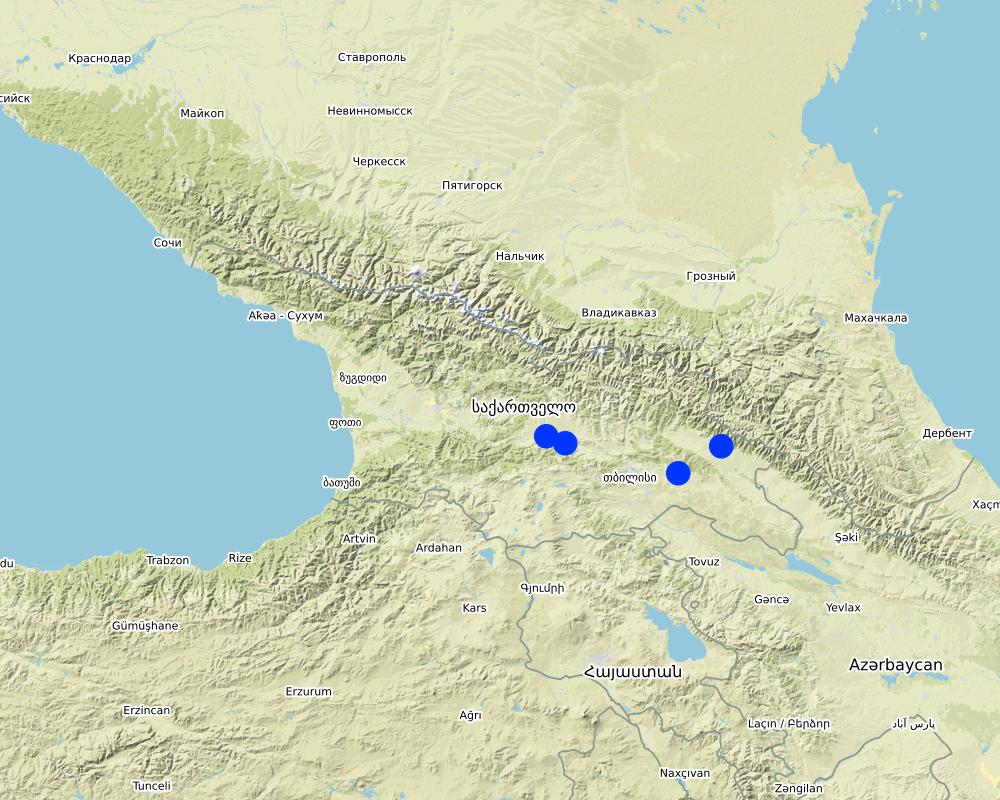Land Degradation Neutrality Transformative Projects and Programmes (LDN-TPP) for sustainable agriculture and rural development [Georgia]
- Creación:
- Actualización:
- Compilador: Daniel Zollner
- Editores: Anneliese Fuchs, Michael Huber
- Revisores: William Critchley, Rima Mekdaschi Studer
LDN-TPP in Georgia
approaches_5902 - Georgia
Visualizar secciones
Expandir todo Colapsar todos1. Información general
1.2 Detalles de contacto de las personas de referencia e instituciones involucradas en la evaluación y la documentación del Enfoque
Especialista MST:
Especialista MST:
Zumbulidze Maia
REC Caucasus
Georgia
Nombre del proyecto que facilitó la documentación/ evaluación del Enfoque (si fuera relevante)
Generating Economic and Environmental Benefits from Sustainable Land Management for Vulnerable Rural Communities of Georgia (GREENLANDS)Nombre de la(s) institución(es) que facilitaron la documentación/ evaluación del Enfoque si fuera relevante)
Global Environment Facility Georgia (GEF Georgia) - Georgia1.3 Condiciones referidas al uso de datos documentados mediante WOCAT
¿Cuándo se compilaron los datos (en el campo)?
04/11/2019
El compilador y la/s persona(s) de referencia claves aceptan las condiciones acerca del uso de los datos documentados mediante WOCAT :
Sí
1.4 Referencia/s al/los Cuestionario(s) de Tecnologías MST
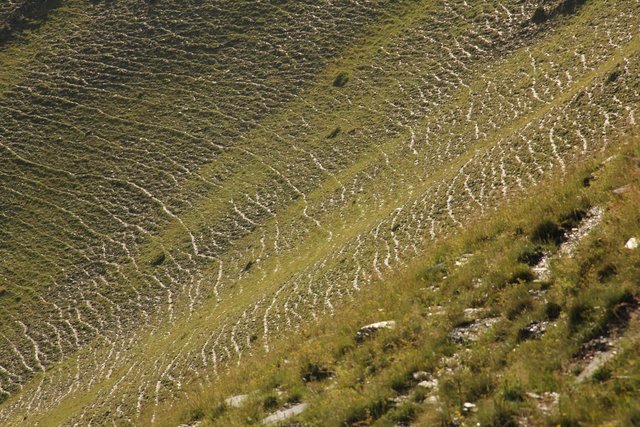
Remote Sensing as a Tool for Land Degradation … [Georgia]
Land degradation contributes to biodiversity loss and the impoverishment of rural livelihoods in Tusheti. Above all, however, land degradation are triggered by climate change as traditional land use practise might not be adapted to new climate conditions which can cause or speed up degradation processes significantly. On the other hand, …
- Compilador: Hanns Kirchmeir
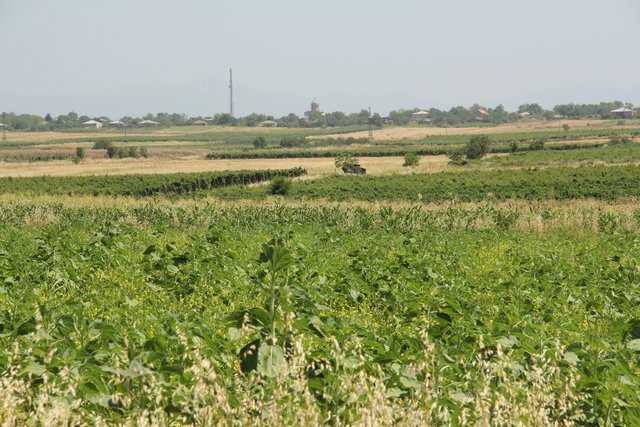
Community Land Use Planning in Arkhiloskalo [Georgia]
Unsustainable land use practices, such as deforestation, overgrazing and improper agricultural management systems are triggering the loss and degradation of valuable land resources in Georgia. Land use planning is one of the measures among others to contribute to support the integration of good Landscape and Sustainable Land Management (L-SLM) principles …
- Compilador: Hanns Kirchmeir
2. Descripción del Enfoque MST
2.1 Breve descripción del Enfoque
In the framework of the project ‘Generating Economic and Environmental Benefits from Sustainable Land Management for Vulnerable Rural Communities of Georgia’, Land Degradation Neutrality Transformative Projects and Programmes (LDN-TPP) were developed to implement the LDN targets at municipal level.
The approach defines the process to break down global and international LDN targets and to translate these into local contributions from the municipalities of Gori, Kareli, Kvareli and Sagarejo.
2.2 Descripción detallada del Enfoque MST
Descripción detallada del Enfoque MST:
The three-year project ‘Generating Economic and Environmental Benefits from Sustainable Land Management for Vulnerable Rural Communities of Georgia' funded by the Global Environment Facility (GEF), is implemented by the United Nations Environment Programme (UNEP) and executed by the Regional Environmental Centre for the Caucasus (RECC). The initiator and beneficiary of the project is the Ministry of Environmental Protection and Agriculture of Georgia. Within this framework, Land Degradation Neutrality Transformative Projects and Programmes (LDN-TPP) were developed to implement the LDN targets at municipal level.
The project aims to create an enabling environment at the community level to achieve the country's goal of Gender Responsive Land Degradation Neutrality (LDN). The project supports local farmers to apply sustainable land management and climate-smart agricultural practices to promote food security and resilience in order to reduce the impacts of erosion, salinisation and soil fertility reduction in Sagarejo, Kvareli, Gori and Kareli on 20,000 ha of pilot land. As a result, it is expected that there will be an improved understanding of the economics of land degradation and integrated land use planning at national and sub-national levels. In the preceding approach recorded under WOCAT, namely ‘Integrated Land Use Plans (ILUPs) for sustainable agriculture and rural development with special emphasis on SLM, CSA and LDN in four municipalities [Georgia]’, ILUPs were developed for four municipalities providing a detailed spatial basis. A separate study (Ballesteros et al. 2020) compiled baseline information about LDN indicators.
This approach complements the ILUP. It combines the spatial information elaborated for land use planning, the LDN baseline information with national LDN targets, UNCCD principles for LDN and municipal stakeholder priorities to come up with a concrete plan for the municipal contribution to (inter)national targets. Thus, this approach serves to operationalise the national LDN targets at municipal level. At the time of documentation of this apporach, planning was completed and the participatory process for validation and decision-making for concrete targets had been initiated.
Taking this into account, a targeted programme was designed, which breaks down national targets into municipal targets with related activities and spatially explicit priority areas for implementation. This approach serves to operationalise LDN-related recommendations and proposed actions as presented and defined in the Integrated Land Use Plan. It seeks to define the contribution of the municipalities Gori, Kareli, Kvareli and Sagarejo to the achievement of national and global LDN targets.
The output is intended to serve as a starting point for local discussion (especially with the LDN Working Group) to further specify and prioritise the objectives and measures proposed. It provides a solid basis for discussing (a) concrete measures and (b) the areas best suited for these measures. The approach is documented in a consolidated document on how the municipality can contribute to the national LDN goals, based on the specific situation and potentials of the municipality.
The LDN TPP focuses on specific objectives and actions in the area of the municipality and its various functional land units in a pro-active, forward-looking and visionary manner as a contribution to the nationally set LDN objectives and the overall LDN vision. It presents possible and recommended development pathways and focuses predominantly on LDN implementation options through the application and adoption of various SLM and CSA practices.
2.3 Fotos del Enfoque
2.5 País/ región/ lugares donde el Enfoque fue aplicado
País:
Georgia
Región/ Estado/ Provincia:
Shida Kartlii and Kakheti
Especifique más el lugar :
Gori, Kareli, Kvareli and Sagarejo
Comentarios:
The points are located within the four municipalities of Gori, Kareli, Kvareli and Sagarejo. The land use plan was prepared for the entire territory of the four municipalities.
Map
×2.6 Fechas de inicio y conclusión del Enfoque
Indique año del inicio:
2019
2.7 Tipo de Enfoque
- proyecto/ basado en un programa
2.8 Propósitos/ objetivos principales del Enfoque
The approach seeks to define the local contribution of the municipalities Gori, Kareli, Kvareli and Sagarejo to the achievement of national and global LDN targets whilst meeting local needs and priorities
2.9 Condiciones que facilitan o impiden la implementación de la/s Tecnología/s aplicadas bajo el Enfoque
normas y valores sociales/ culturales/ religiosos
- facilitan
There is a recognised need to improve land use planning and to counter land degradation as agricultural production is declining
disponibilidad/ acceso a recursos y servicios financieros
- impiden
Even though funding is provided through the project, the resources available at the municipality are very limited.
entorno institucional
- facilitan
The establishment of Municipal LDN Working groups allows for a concrete discussion of LDN with adequate municipal participation. It also allows for including local knowledge in the planning process
- impiden
Currently, municipalities have very limited capacities for land use planning.
colaboración/ coordinación de actores
- facilitan
REC has a very strong presence and links to the municipalities through previous and ongoing projects.
- impiden
This was very challenging due to COVID-19 restrictions. Fewer meetings were held than foreseen delaying the process of discussion of municipal targets and activities.
marco de trabajo legal (tenencia de tierra, derechos de uso de tierra y agua)
- impiden
For the strategic planning, land tenure was only a minor topic. However, in general, when it comes to the specific location of measures, land tenure will be amongst the key issues.
políticas
- facilitan
Well-supported through municipal involvement.
gobernanza de tierras (toma de decisiones, implementación y aplicación)
- facilitan
Municipal LDN group as municipal sounding board was a big plus.
conocimiento de MST, acceso a apoyo técnico
- facilitan
There are several successful previous projects already providing a good set of measures and creating awareness amongst land users for SLM
3. Participación y roles de las partes interesadas involucradas
3.1 Partes interesadas involucradas en el Enfoque y sus roles
- usuarios locales de tierras/ comunidades locales
Various farmers
Visits to the fields with the local farmers, discussions about the type of cultivation
- investigadores
Tbilisi State University
Contribution of expert knowledge during meetings to interpret findings in a municipal context; provision of relevant scientific data;
- ONG
REC Caucasus
Supervisors, consultants, GIS analyses, participation in the LDN Working Group Meeting
- gobierno local
Executive Office of the Gori Municipal Council
I Mayor’s City Hall (formerly Municipal Administration“Gamgeoba”), Municipality of Gori
I Mayor’s City Hall (formerly Municipal Administration“Gamgeoba”), Municipality of Kareli
I Mayor’s City Hall (formerly Municipal Administration“Gamgeoba”), Municipality of Kvareli
I Mayor’s City Hall (formerly Municipal Administration“Gamgeoba”), Municipality of Sagarejo
Participation in the LDN Working Group Meeting
- gobierno nacional (planificadores, autoridades)
Agricultural and Rural Development Agency (ARDA)
Ministry of Environmental Protection and Agriculture of Georgia (MEPA)
Participation in the LDN Working Group Meeting
3.2 Involucramiento de los usuarios locales de tierras/ comunidades locales en las distintas fases del Enfoque
| Involucramiento de los usuarios locales de tierras/ comunidades locales | Especifique quién se involucró y describa las actividades | |
|---|---|---|
| iniciación/ motivación | ninguno | |
| planificación | pasivo | Local land users were consulted to gain experience and insight into the situation of agriculture in the different areas. The interviews were then incorporated in the preparation of the maps and land use plans. Stakeholder priorities formulated during the meetings were the basis for the setting of the municipal targets. Due to COVID 19 the related participatory process to validate the proposed targets, activities and locations has only started recently. Thus, finally the classification would rather refer to "interactive planning". |
| implementación | ninguno | |
| monitoreo y evaluación | ninguno | M&E will be provided in a later stage once the decisions are made regarding the final activities and priorities |
3.4 La toma de decisiones en la selección de Tecnología(s) MST
Especifique quién decidió la selección de las Tecnología/ Tecnologías a implementarse:
- principalmente por especialistas MST en consulta con usuarios de tierras
Explique:
After initial consultations, the plan was prepared based on scientific and GIS-based information translating it into a muncipal programme. The process will be concluded once the programme is validated and discussed with land users and municipal administration (ongoing process).
Especifique las bases que sustentaron la toma de decisiones:
- la evaluación de conocimiento MST bien documentado (la toma de decisiones se basa en evidencia)
- hallazgos de investigaciones
- la experiencia personal y opiniones (no documentadas)
4. Apoyo técnico, fortalecimiento institucional y gestión del conocimiento
4.1 Construcción de capacidades / capacitación
¿Se proporcionó la capacitación a usuarios de tierras/ otras partes interesadas?
No
4.2 Servicio de asesoría
¿Los usuarios de tierras tienen acceso a un servicio de asesoría?
No
4.3 Fortalecimiento institucional (desarrollo institucional)
¿Se establecieron o fortalecieron instituciones mediante el Enfoque?
- sí, un poco
Especifique el nivel o los niveles en los que se fortalecieron o establecieron las instituciones:
- local
Describa la institución, roles y responsabilidades, miembros, etc.
Within the framework of the project, municipal Land Degradation Neutrality Groups were established comprising municipal stakeholders and land users. This board serves to discuss LDN issues, define priorities and provide knowledge about local phenomena of land degradation (e.g. participatory mapping of degradation)
Especifique el tipo de apoyo:
- construcción de capacidades/ entrenamiento
Proporcione detalles adicionales:
Basically, these groups were consulted for the identification of priorities and land-degradation mapping in the municipality. In a follow-up step, these groups will play a crucial role in decision-making and implementation of the programme.
4.4 Monitoreo y evaluación
¿El monitoreo y la evaluación forman parte del Enfoque?
No
Comentarios:
The current approach designed a LDN-TPP at municipal level. Once the municipality decides about the final priorities and measures to be taken, a monitoring plan will be included.
4.5 Investigación
¿La investigación formó parte del Enfoque?
Sí
Especifique los temas:
- sociología
- ecología
- tecnología
Proporcione detalles adicionales e indique quién hizo la investigación:
The designed programme builds on 3 main elements: (1) local knowledge through project-based experiences and implicit knowledge of land users and the LDN group, (2) a spatial analysis of land use within the frame of the land-use planning process (see Zollner, 2021, separate approach recorded under Wocat) and (3) a LDN baseline study about the three global LDN indicators (land cover, net primary production and soil organic carbon) (Ballesteros et al. 2020).
5. Financiamiento y apoyo material externo
5.1 Presupuesto anual para el componente MST del Enfoque
Si no se conoce el presupuesto anual preciso, indique el rango:
- 10,000-100,000
Comentarios (ej. fuentes principales de financiamiento/ donantes principales):
This amount covers the elaboration of four programmes for four municipalities excluding the final implementation. Depending on the funding source and the final political decisions, the implementation of the programmes ranges from 500,000 - 4,000,000 USD. The costs for this process were funded by GEF via UNDP.
5.2 Apoyo financiero/material proporcionado a los usuarios de tierras
¿Los usuarios de tierras recibieron financiamiento/ apoyo material para implementar la Tecnología/ Tecnologías? :
No
5.3 Subsidios para insumos específicos (incluyendo mano de obra)
- ninguno
5.4 Crédito
¿Se proporcionó crédito bajo el Enfoque para actividades MST?
No
5.5 Otros incentivos o instrumentos
¿Se usaron otros incentivos o instrumentos para promover la implementación de Tecnologías MST?
No
6. Análisis de impacto y comentarios de conclusión
6.1 Impactos del Enfoque
¿El Enfoque facilitó la toma de decisiones basada en evidencia?
- No
- Sí, un poco
- Sí, moderadamente
- Sí, mucho
It provides hard facts and spatial information about degradation, priority areas and potential measures for decision-makers
¿El Enfoque ayudó a los usuarios de tierras a implementar y mantener Tecnologías MST?
- No
- Sí, un poco
- Sí, moderadamente
- Sí, mucho
Not yet. As it is a plan.
¿El Enfoque mejoró la coordinación e implementación efectiva en costos de MST?
- No
- Sí, un poco
- Sí, moderadamente
- Sí, mucho
It links the land-use planning process (and its results) with scientific information and translates it into actions - it builds on existing knowledge.
¿El Enfoque movilizó/mejoró el acceso a recursos financieros para implementar MST?
- No
- Sí, un poco
- Sí, moderadamente
- Sí, mucho
By linking local priorities with (inter)national obligations, it is expected that it will help to mobilise additional resources.
¿El Enfoque mejoró el conocimiento y capacidades de los usuarios para implementar MST?
- No
- Sí, un poco
- Sí, moderadamente
- Sí, mucho
It provides solid condensed and local information to the Municipal LDN group
¿El Enfoque mejoró el conocimiento y capacidades de otras partes interesadas?
- No
- Sí, un poco
- Sí, moderadamente
- Sí, mucho
Close cooperation with international experts and local consultants increased the GIS-mapping capabilities of the national expert.
¿El Enfoque construyó/ fortaleció instituciones, colaboración entre partes interesadas?
- No
- Sí, un poco
- Sí, moderadamente
- Sí, mucho
The municipal LDN group is a cross-institutional group of municipal stakeholders dealing with land degradation at municipal level.
¿El Enfoque mitigó conflictos?
- No
- Sí, un poco
- Sí, moderadamente
- Sí, mucho
This is expected to happen as together with land use planning it identifies priorities, challenges and needs.
¿El Enfoque empoderó a grupos en desventaja social y económica?
- No
- Sí, un poco
- Sí, moderadamente
- Sí, mucho
Not yet, as these groups have not yet been involved - but will be involved (particularly land-users) who are the final beneficiaries of the measures.
¿El Enfoque mejoró la equidad de género y empoderó a las mujeres y niñas?
- No
- Sí, un poco
- Sí, moderadamente
- Sí, mucho
It was not a major consideration. Work was only with the Municipal LDN group (which included women).
¿El Enfoque alentó a jóvenes/ la siguiente generación de usuarios de tierras a involucrarse con MST?
- No
- Sí, un poco
- Sí, moderadamente
- Sí, mucho
It was not a major consideration. Work was only with the Municipal LDN group
¿El Enfoque mejoró cuestiones de tenencia de tierra/ derechos de usuarios que obstaculizaron la implementación de la Tecnologías MST?
- No
- Sí, un poco
- Sí, moderadamente
- Sí, mucho
It addresses and highlights some of the pressing issues.
¿El Enfoque resultó en mejor seguridad alimentaria/ mejoró la nutrición?
- No
- Sí, un poco
- Sí, moderadamente
- Sí, mucho
Not yet, but if implemented, it will make a major contribution.
¿El Enfoque mejoró el acceso a los mercados?
- No
- Sí, un poco
- Sí, moderadamente
- Sí, mucho
Not yet, but if implemented, it will make a major contribution.
¿El Enfoque llevó a un acceso mejorado a tierra y saneamiento?
- No
- Sí, un poco
- Sí, moderadamente
- Sí, mucho
Not yet, but if implemented, it will make a significant contribution as water security , sustainable irrigation, and protection of water resources are key topics.
¿El Enfoque llevó a un uso más sostenible/ fuentes de energía?
- No
- Sí, un poco
- Sí, moderadamente
- Sí, mucho
Not a priority.
¿El Enfoque mejoró la capacidad de los usuarios de tierras a adaptarse a los cambios climáticos/ extemos y mitigar desastres relacionados al clima?
- No
- Sí, un poco
- Sí, moderadamente
- Sí, mucho
Not yet, but if implemented, this is supposed to be one of the major contributions of the programme.
¿El Enfoque llevó a oportunidades de empleo, ingresos?
- No
- Sí, un poco
- Sí, moderadamente
- Sí, mucho
Not yet, but it seeks to enhance and secure incomes of farmers in the muncipality and outlines alternative income opportunities
6.2 Motivación principal del usuario de la tierra para implementar MST
- producción incrementada
- incremento de la renta(bilidad), proporción mejorada de costo-beneficio
- reducción de la degradación del suelo
- reducción del riesgo de desastres naturales
- afiliación al movimiento/ proyecto/ grupo/ redes
6.3 Sostenibilidad de las actividades del Enfoque
¿Pueden los usuarios de tierras sostener lo que se implementó mediante el Enfoque (sin apoyo externo)?
- sí
Si respondió que sí, describa cómo:
The programme seeks agricultural transformation and a change in agricultural practice both reducing land degradation and increasing land productivity
6.4 Fortalezas/ ventajas del Enfoque
| Fuerzas/ ventajas/ oportunidades desde la perspectiva del usuario de la tierra |
|---|
| Allows for a discussion based on maps displaying degradation challenges. This makes it easier to concretly agree on measures and priorities |
| Fuerzas/ ventajas/ oportunidades desde la perspectiva del compilador o de otra persona de referencia clave |
|---|
| Combination of stakeholder priorities, local conditions, scientific baseline information and spatially very clear maps |
| Linking different plans and strategies with (inter)national obligations and targets at local level. This is a good basis for attracting funding and targeted interventions |
| Comprehensive, intersectoral and local approach connecting climate change, agricultural development, ecological and social aspects |
6.5 Debilidades/ desventajas del Enfoque y formas de sobreponerse a ellos
| Debilidades/ desventajas/ riesgos desde la perspectiva del usuario de la tierra | ¿Cómo sobreponerse a ellas? |
|---|---|
| Local capacities are rather low and require external funding | Increased capacity building of the Muncipal LDN Group as key resource |
| Debilidades/ desventajas/ riesgos desde la perspectiva del compilador o de otra persona de referencia clave | ¿Cómo sobreponerse a ellas? |
|---|---|
| Due to COVID 19 a more participatory discussion of targets and exact location and scope of measures is still required (but planned) | The planning process can be extended to enable the participatory process |
| Without a capable local lead, it will be challenging | With REC which has been involved for a long time in the region, capable support and exact knowledge of local capacities is available. |
7. Referencias y vínculos
7.1 Métodos/ fuentes de información
- visitas de campo, encuestas de campo
One field visit of the international consultant (Meeting with LDN Municipal Group, participatory mapping, onsite visit, consultations with stakeholders) and several visits of the RECC.
- entrevistas con usuarios de tierras
During the field visit
- compilación de informes y otra documentación existente
7.2 Referencias a publicaciones disponibles
Título, autor, año, ISBN:
Ballesteros Canovas, J.A., Da Silva Correia, G., Schlechten, J., Zumbulidze, M. & Stoffel, M. 2020: Report. Generating Economic and Environmental Benefits from Sustainable Land Management for Vulnerable Rural Communities of Georgia. University of Geneva
¿Dónde se halla disponible? ¿Costo?
REC Caucasus
Título, autor, año, ISBN:
Huber, M., Zollner, D., Zumbulidze, M., 2021: Sagarejo Land Degradation Neutrality Transformative Programme (LDN-TPP Sagarejo) for sustainable agriculture and rural development with special emphasis on SLM, CSA and LDN (Part B – LDN TPP Sagarejo). Version 2.0. Klagenfurt, Tbilisi, Sagarejo. 56 p.
¿Dónde se halla disponible? ¿Costo?
REC Caucasus
Título, autor, año, ISBN:
Huber, M., Zollner, D., Zumbulidze, M., 2021: Kareli Land Degradation Neutrality Transformative Programme (LDN-TPP Kareli) for sustainable agriculture and rural development with special emphasis on SLM, CSA and LDN (Part B – LDN-TPP Kareli). Version 2.0. Klagenfurt, Tbilisi, Kareli. 61 p.
¿Dónde se halla disponible? ¿Costo?
REC Caucasus
Título, autor, año, ISBN:
Huber, M., Zollner, D., Zumbulidze, M., 2021: Gori Land Degradation Neutrality Transformative Programme (LDN-TPP Gori) for sustainable agriculture and rural development with special emphasis on SLM,CSA and LDN (Part B – LDN-TPP Gori). Version 2.0. Klagenfurt, Tbilisi, Gori. 55 p.
¿Dónde se halla disponible? ¿Costo?
REC Caucasus
Título, autor, año, ISBN:
Huber, M., Zollner, D., Zumbulidze, M., 2021: Kvareli Land Degradation Neutrality Transformative Programme (LDN-TPP Kvareli) for sustainable agriculture and rural development with special emphasis on SLM, CSA and LDN (Part B – ILUP Kvareli). Version 2.0. Klagenfurt, Tbilisi, Kvareli. 54 p.
¿Dónde se halla disponible? ¿Costo?
REC Caucasus
Título, autor, año, ISBN:
Zollner, D., Zumbulidze, M., Kirchmeir, H., Fuchs, A. und Huber, M. 2021: Gori Integrated Land Use Plan (ILUP Gori) for sustainable agriculture and rural development with special emphasis on SLM, CSA and LDN. Part A – ILUP Gori. Version 2.0. Klagenfurt, Tbilisi, Gori. 80 p. + documentation volume/ annex.: REC Caucasus, E.C.O- Institute of Ecology
¿Dónde se halla disponible? ¿Costo?
REC Caucasus
Título, autor, año, ISBN:
Zollner, D., Zumbulidze, M., Kirchmeir, H., Fuchs, A. und Huber, M. 2021: Kareli Integrated Land Use Plan (ILUP Gori) for sustainable agriculture and rural development with special emphasis on SLM, CSA and LDN. Part A – ILUP Gori. Version 2.0. Klagenfurt, Tbilisi, Gori. 80 p. + documentation volume/ annex.: REC Caucasus, E.C.O- Institute of Ecology
¿Dónde se halla disponible? ¿Costo?
REC Caucasus
Título, autor, año, ISBN:
Zollner, D., Zumbulidze, M., Kirchmeir, H., Fuchs, A. und Huber, M. 2021: Kvareli Integrated Land Use Plan (ILUP Gori) for sustainable agriculture and rural development with special emphasis on SLM, CSA and LDN. Part A – ILUP Gori. Version 2.0. Klagenfurt, Tbilisi, Gori. 80 p. + documentation volume/ annex.:REC Caucasus, E.C.O- Institute of Ecology
¿Dónde se halla disponible? ¿Costo?
REC Caucasus
Título, autor, año, ISBN:
Zollner, D., Zumbulidze, M., Kirchmeir, H., Fuchs, A. und Huber, M. 2021: Sagarejo Integrated Land Use Plan (ILUP Gori) for sustainable agriculture and rural development with special emphasis on SLM, CSA and LDN. Part A – ILUP Gori. Version 2.0. Klagenfurt, Tbilisi, Gori. 80 p. + documentation volume/ annex.: REC Caucasus, E.C.O- Institute of Ecology
¿Dónde se halla disponible? ¿Costo?
REC Caucasus
7.3 Vínculos a la información relevante disponible en línea
Título/ descripción:
UNCCD Checklist for Land Degradation Neutrality Transformative Projects and Programmes (LDN TPP)
URL:
https://knowledge.unccd.int/sites/default/files/2018-09/LDN%20TPP%20checklist%20final%20draft%20040918.pdf
Título/ descripción:
UNCCD Land Degradation Neutrality Transformative Projects and Programmes: Operational Guidance for Country Support
URL:
https://www.unccd.int/publications/land-degradation-neutrality-transformative-projects-and-programmes-operational
Vínculos y módulos
Expandir todo Colapsar todosVínculos

Remote Sensing as a Tool for Land Degradation … [Georgia]
Land degradation contributes to biodiversity loss and the impoverishment of rural livelihoods in Tusheti. Above all, however, land degradation are triggered by climate change as traditional land use practise might not be adapted to new climate conditions which can cause or speed up degradation processes significantly. On the other hand, …
- Compilador: Hanns Kirchmeir

Community Land Use Planning in Arkhiloskalo [Georgia]
Unsustainable land use practices, such as deforestation, overgrazing and improper agricultural management systems are triggering the loss and degradation of valuable land resources in Georgia. Land use planning is one of the measures among others to contribute to support the integration of good Landscape and Sustainable Land Management (L-SLM) principles …
- Compilador: Hanns Kirchmeir
Módulos
No se hallaron módulos


